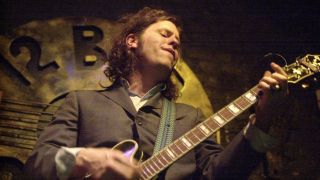On January 11 this year, the 12 Bar in London’s Denmark Street shut down after two decades as one of the pre-eminent small clubs in Central London.
Film maker Tali Clarke chronicled the last few days of the 12 Bar, capturing the atmosphere of the final nights at a venue that had gained a reputation as a feeding ground for young talent, opening its doors to any artist, as long they “weren’t Nazis or didn’t play very heavy metal”. Amongst those to have graced the venue’s stage were Jeff Buckley, Seasick Steve, Kristin Hersch, Frank Turner, Sex Pistols’ guitarist Steve Jones, Gordon Giltrap, Stell Panther and Sleaford mods. Clarke talked to some of the great characters who worked at the club, and the results have just been released as the documentary A Riot Of Our Own.
What made you want to do a documentary on the 12 Bar in the first place?
I was born in London and grew up here. Live music has always been a massive part of my life and really shaped who I am and the environments I’ve existed in. Small independent venues like the 12 Bar Club played a massive part in that. The 12 Bar Club in particular was a very important venue, due to it being in the centre of London, and the manager Barnet Mark having such an amazing, inclusive booking policy where he would happily put on small and unknown bands. With so many venues being shut down in the city I wanted to make a film to capture what is being lost, not just as an honest tribute and memory for those that were involved, but as a historical document of its cultural importance to the city.
The documentary is about the end of an era, really. Was that what you set out to do?
Absolutely. The 12 Bar Club was a unique place in that the community surrounding it was so strong, in such a central part of London that had already become homogenised and lifeless around it. Due to the strong musical heritage and continued trade in Denmark Street, it became the hub of the community that surrounded this, as well as welcoming in anyone that wanted to experience it.
Were you given full access by the 12 Bar?
Yes, I contacted them directly, and as Barnet Mark knows me from coming to shows and playing in my band, and also the Assistant Manager Nico who plays in a band in a similar scene, they were very open to letting me document everything I wanted to.
Did you ever try to contact the 12 Bar’s landlords to find out why they were shutting it down?
I felt that side of it wasn’t entirely relevant to this film; I wanted to make a very personal film about the heart and soul of the place, as something for the people by the people. And landlords have very little to do with that.
Did you find yourself getting involved with the stories of the genuine characters you interviewed?
Everyone I interviewed was amazing. They all had so much passion towards the place and what was happening, and even though they all felt a similar way, the way in which they expressed it, and the individual ways it was going to personally effect them was all very different. I think many of them enjoyed speaking to me, and a few mentioned the interview process was a bit like therapy!
The story is a bigger one, in that it’s also the end of Denmark Street as a traditional centre for music. Were you tempted to expand the documentary to take in what’s happening to the music shops in the street?
This film was really about the community of that specific place (which was the main community hub of the area anyway, all the music shops included) so I didn’t feel it would benefit the film by including this.
You covered the attempt to occupy the 12 Bar once it had been officially closed. Was that something you expected to happen?
There were murmurs of it in the final weeks, but we didn’t know which group would finally get in there (it ended up being Bohemians 4 Soho). I felt it vital to cover this because it showed how it actually became a symbol of cultural cleansing in the city.
Were you tempted to include footage from the opening of the new 12 Bar in Holloway Road?
I went to the new 12 Bar Club the day after it opened, spoke to a few people and filmed some stuff, but again it didn’t feel right to go into the film. The new bar is not the same thing.
Do you feel the loss of the 12 Bar is actually a big blow to the London music scene?
It has been a massive symbolic ‘fuck you’ to the people that cared; a great loss to London’s musical history and heritage to those that would have been interested in it.


